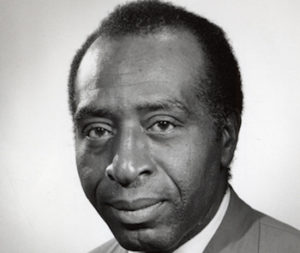
Harold Cruse
*Harold Cruse was born on this date in 1916. He was a Black author and intellectual.
Harold Wright Cruse was from Petersburg, Va., and was taken to New York by his father, who had divorced his mother. He was determined to be a writer but also developed a lifelong appreciation for the arts through an aunt who took him to Black vaudeville shows on the weekends. As a teenager, he did technical work at the YMCA Theater in Harlem. After serving in the Army during World War II, he attended the George Washington Carver School. He heard a civil rights leader's W.E.B. Du Bois lecture at this Harlem institution run by the poet Gwendolyn Bennett. He regarded the school as "the Communist Party's cultural base in Harlem."
He wrote briefly for the Communist newspaper The Daily Worker and failed as a playwright. He visited Cuba in 1960 as part of a delegation of Black intellectuals, wrote for newspapers and magazines, and taught Black history for Harlem’s Black Arts Repertory Theatre/School. Cruse saw himself as a dissident who offered political critiques along artistic lines. He used writing to explore social justice and equality, relationships between Blacks and Jews (he resented the idea that a significant bond existed between the groups), and Black literature that appealed to mass, white audiences. He considered it farcical that Lorraine Hansberry's play "A Raisin in the Sun" would be regarded as a realistic portrait of working-class Chicago life.
He criticized notable figures of all races, from the Gershwins for "stealing" Harlem jazz to Black scholar Cornel West, whose fondness for quoting European philosophers annoyed him. A New Yorker reviewer wrote that Cruse's book "The Crisis of the Negro Intellectual," published in 1967, "will infuriate almost everyone." Viewed by some as a brilliant rant and others as engaging but flawed, the book established the author as a leading personality among Black thinkers of the day. William Jelani Cobb, an assistant history professor at Spelman College who edited "The Essential Harold Cruse," wrote that next to "The Autobiography of Malcolm X" and Frantz Fanon's "The Wretched of the Earth," Mr. Cruse's book was "required reading among Black Powerites."
Cruse held an uncertain view of capitalism and its economic influence over the working class and the media. However, he also believed pragmatism was more influential in contemporary life than the social and racial utopias promoted by American Marxists and Communists. Fascinated by the intersection of the arts and social change, he slammed white pop and jazz musicians and composers who "achieved status and recognition in the 1920s for music that they stole outright from Harlem nightclubs." He called for Black performers and technicians to boycott any future production of the Gershwin folk opera "Porgy and Bess," which he considered "a symbol of that deeply ingrained American cultural paternalism practiced on Negroes ever since the first Southern white man blacked his face."
Neither did he feel the Harlem Renaissance was a success. He said it was integrationist in nature and did not meet his standards for addressing Black identity. Because of the book's notoriety, Cruse was invited to lecture at the University of Michigan in 1968. Within a decade, he had risen to full professor of history, reportedly one of the first Blacks without a college degree to receive tenure at a major university. In 1970, he helped found the university's Center for Afro-American and African Studies. He retired in the mid-1980s as professor emeritus of history and African American studies.
After retiring from Michigan, he wrote: "Plural but Equal" (1987), a book that was damning of the 1954 Brown v. Board of Education decision. "As it was implemented in the South," he wrote, "the Brown decision eliminated black teachers, black principals, black administrators, a whole generation of experienced administrative public school personnel made superfluous by integration." He concluded that "the progress of racial integration as public policy can be seen as a process that has left the majority of the black population stranded and stalled at the edges of power while the inner sanctums were protected from change."
Harold Cruse died on March 25, 2005, at an assisted living facility in Ann Arbor, Mich. He had congestive heart failure. Survivors include his companion of 36 years, Mara Julius of Ann Arbor, and two half-sisters.